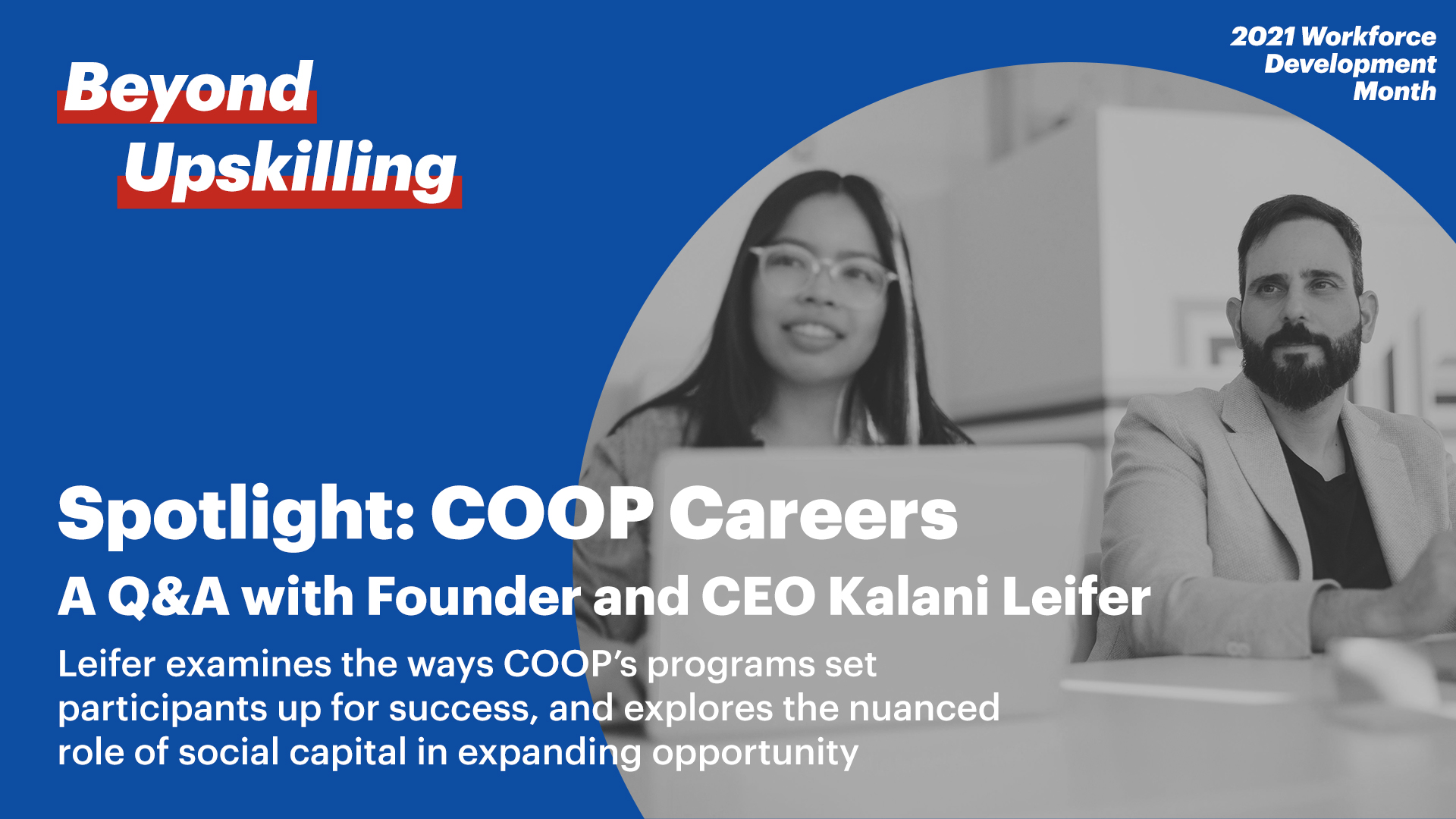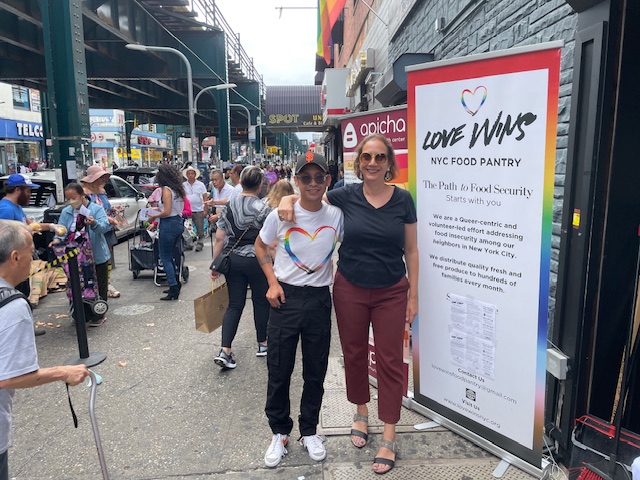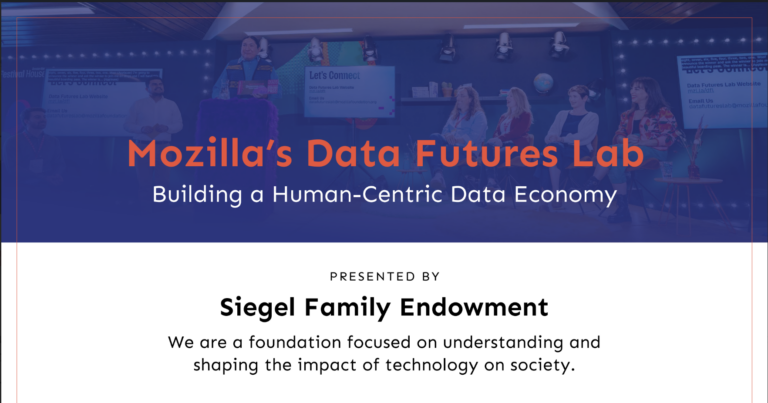
by Kalani Leifer
What are the most impactful ways to create scalable, equitable opportunities for wealth-creation when barriers to entry and credential requirements are constantly changing? A critical segment of Siegel Family Endowment’s workforce grantmaking aims to develop inclusive entrepreneurial innovation ecosystems and career pathways that are open to and centered on historically excluded populations. A key grantee in this space is COOP Careers, an organization that aims to increase employment opportunities for recent first generation and low income college graduates by closing the social opportunity gap, and actively cultivating new social networks.
In this first article in SFE’s ‘Beyond Upskilling’ series, COOP’s founder and CEO Kalani Leifer examines the ways in which the organization’s programs set participants up for success, and explores the nuanced role of social capital in expanding opportunity.
What are the characteristics of a “good job” in today’s economy? What standard should employees seek, and how can programs like yours motivate them to seek jobs that meet those standards?
COOP tackles a very specific but frustratingly widespread challenge: underemployment among first-generation and low-income college graduates. Overall, it clearly does pay to graduate. Compared to other young workers, recent college graduates (ages 22-27) are half as likely to be unemployed and they earn 50 percent more on average.
But that’s not the whole story. Over 40 percent of recent grads are underemployed, working in positions that don’t require a bachelor’s degree. On average, they earn $10,000 less than their fully employed peers — and these consequences are long-lasting, similar to “the scarring effects” of extended unemployment (or graduating in a recession). Two-thirds of college grads underemployed in their first post-college job are still stuck five years later, and most remain so after a decade.
Our mission is to “overcome underemployment through digital skills and peer connections” — to help first-gen and low-income grads secure their first “good job.” To us, this means a full-time position that requires a bachelor’s degree, pays benefits and a living wage, and contributes to an upward career trajectory. In short, will this job and title help or hinder the pursuit of the next job?
In our experience, underemployment is rarely due to a lack of motivation or even a lack of skills. In fact, we believe isolation causes underemployment — especially isolation from peers. Skills and motivation will not get a resume to the top of the pile, nor do they offer much consolation after a string of rejected applications. We need relationships for all that.
What criteria do you use to define “in-demand” careers?
Over the last seven years, COOP has found success by focusing on the “digital economy” (think tech but not coding) and by following our alumni into new fields as their careers evolve.
From the beginning, we’ve shied away from pursuing flashy, six-figure programming jobs. While coding is clearly the “tentpole” skillset of the digital economy, it’s by no means the only way to take part in the bounty of Big Tech. Proficiency in coding requires an immense investment of time and energy, and it doesn’t necessarily build from the foundation of a (non-technical) undergraduate degree.
Most college grads are essentially generalists, but that doesn’t stop privileged candidates from landing good entry-level jobs in tech. Likewise, CUNY and Cal State grads don’t need thousands of hours of additional training in order to contribute meaningfully in the digital economy. That said, some skills training (and a timely dose of social capital) can help unlock the huge economic potential of a non-technical college degree.
Our 200-hour flagship program rests on three pillars: Head, Heart & Hustle. In each of our three career tracks — Digital Marketing, Data Analytics, and Tech Sales — we dedicate just 100 hours to technical skills (“Head”). This has been enough time for most of our “generalists” to prepare for a $50,000 job in the digital economy. That’s not six figures, but it’s an awfully strong start.
Most importantly, alumni lead 100% of our flagship program (as part-time “Cohort Captains”) and provide a generous stream of inbound job referrals. Alumni also refine our curriculum every six months and help us launch career tracks in related sub-industries (e.g. Tech Sales). By mobilizing our alumni, we’ve created an organic feedback loop to ensure new and existing programs continue to focus on in-demand careers.
Why isn’t it enough just to focus on obtaining a job? Why should there be a focus on “career” and “upward mobility?”
For better and worse, careers in America are long and often turbulent — spanning almost half-a-century before retirement (if we ever get there at all). Recent grads are likely to have a dozen employers (or more) over the course of this epic journey, sometimes by choice but often due to forces beyond their control. There will be upheavals: recessions, pandemics, mergers, layoffs, toxic bosses, and midlife crises. The question isn’t whether we fall down, but how we rebound. And that depends almost entirely on the net(work) that catches us and connects us to whatever comes next.
That’s why we need to focus on the long-game — and on playing the game together. Careers are hard, but they shouldn’t be lonely. This is especially true for first-gen grads, who will continue to be the “first” in their family (and often the “only” on their team) for the next 50 years. We’ve learned that overcoming underemployment and securing a first “good job” is just one important step toward upward mobility, economic independence, and intergenerational wealth.
How do you see the conversations around traditional credentialing systems changing to meet new and emerging types of demands?
People tend to think of credentials primarily as a proxy for skills. This includes the bachelor’s degree, which theoretically communicates a host of competencies to a potential employer. From this perspective, generations of prosperous college grads achieved professional success precisely because of the skills they learned in college.
Based on this premise, America has dramatically increased access to the bachelor’s over the last 50 years. What was once an exclusive domain for privileged white men has been democratized — by CUNY, Cal State, and others: America’s Great Working-Class Colleges. But what if privilege has been a confounding variable all along? It could be that the bachelor’s credential is really just a proxy for the social capital we start with freshman year, then concentrate and multiply during four years of campus life.
Unfortunately, that’s not the version of higher education that we’ve scaled and “democratized.” Most first-gen and low-income college grads don’t spend years marinating in social capital at a residential university. They work part-time or even full-time, commute long hours, likely transfer from one institution to another, and rarely start and finish with a defined cohort of peers in four years. Commuter college grads learn the same skills and earn the same credentials, but their degree doesn’t come with a slew of “strong and weak ties.”
To close this gap, urban public colleges should focus on relationships as the primary asset, not an incidental byproduct of skill development. In short, we need to maximize the quantity and quality of peer connections, especially among the vast majority of students who don’t live in dorms. Ultimately, their credentials can be a signal for both skills and social capital.
What kinds of payment models for skills training programs are the most sustainable – both from a business perspective and from a student perspective?
We operate on the assumption that our grads are almost there and, again, don’t need thousands of hours of additional pre-employment training. We also benefit substantially from alumni mobilization, which we estimate saves us roughly $5,ooo to 6,000 per person (versus a more traditional staff-led approach). Thanks to this streamlined, alumni-led model, we’ve been able to keep our fully loaded unit cost at $5,000 to 6,000, less than one year of Pell Grant support.
We believe that employers and the public sector can and should bear this cost in the long-term, through referral bonuses, retention support, and membership fees — and through extended financial aid (e.g. an additional year of Pell Grant support tied to employment outcomes). If just a tiny share of federal education grants were dedicated to post-graduation career success, we could unleash immense value. We do not believe first-gen and low-income college grads — already loaded with crippling student debt — should have to pay more (upfront or over years) to fulfill America’s promise of higher education.
What do you believe has been critical to your success and impact in this space?
COOP’s success comes down to three key ingredients: intimate peer cohorts of underemployed college grads; mobilized alumni leaders who balance “paying it forward” with their busy day jobs; and a laser-focus on full-time jobs after graduation.





